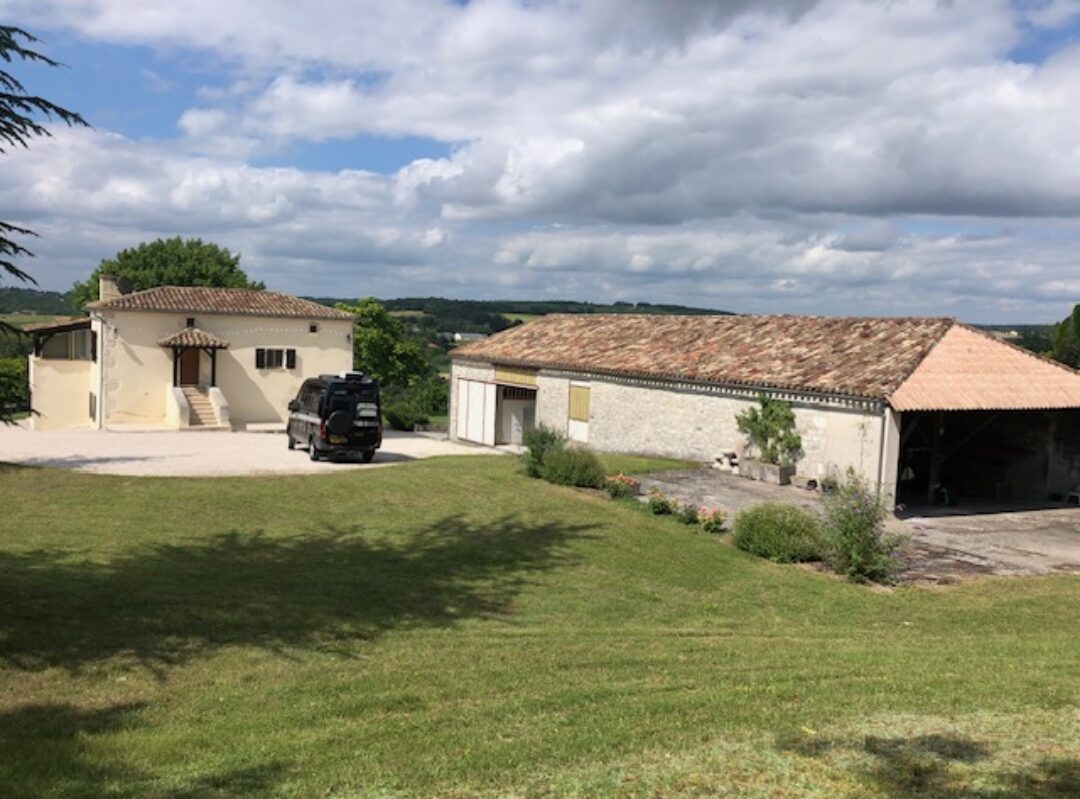We’ve enjoyed cycling through the vineyards over the last few days, following smaller roads to see where they lead, and admiring the soft gold stone buildings in this area. At many crossroads there are beautiful crosses – they may been way markers for pilgrims or guardians for the vines.

In the commune where the campsite is located there is actually ‘une ferme expérimentale’ based at Château d’Anglars where they produce their own wine but also carry out research on the Cahors appellation including new varieties of vines, e.g pest resistant, methods of grafting, bringing back old varieties of grapes/vines and the promotion of the wines in general. Signs in the vineyards next to the campsite show where some of those new vines are being trialled.

Malbec is the dominant grape variety in the Cahors area and it’s the main area of France where you find Malbec. Apparently a frost in 1956 wiped out many vineyards in both Bordeaux and Cahors and it was in Cahors that there was a mass replanting of Malbec vines. Covid is obviously having an effect on many of the smaller châteaux that would usually be open for ad hoc ‘drive by’ tastings and most seem to be by appointment only. We picked up information about an evening event ‘L’éveil des sens’ at a family run vineyard – Chateau de Calassou’ – about 20 minutes away and decided to give that a try. The vineyard is run by a family with no other employees apart from seasonal workers at harvest time. Everything is done at the vineyard with a bottling and labelling machine hired in for 3-4 days at the appropriate point.

We were the only English people in the group, all the others being French, and we started the evening with a tour of the vineyards, and at a first ‘parcelle’ of merlot grapes. In fact the family do not bottle any wine from the merlot grapes but keep it for their own personal use (very nice) or to make other grape products. We saw the damage that various insects cause to the vines and, when the number of vines affected in a particular parcelle reaches 20%, the whole parcelle has to be grubbed up to avoid spread to other vineyards. This particular parcelle stood at 19% but Madame seemed unconcerned given they weren’t wine-producing vines.
We moved on to the Malbec vines which are used for their rosé and red wines. These looked very healthy although they are also susceptible to the ravages of the cicadelle, a green moth, which destroys the leaves of the vines. The vineyard is not organic, but run on an environmentally friendly system and pesticides are only used as a last resort, more because of the cost it seemed. The whole business of wine making seems very precarious and Madame said there had not been an ‘exceptional’ harvest since 2007, such are the vagaries of the weather. Even this year with the lovely dry weather early on, this means there will be less juice from the grapes and therefore reduced volume.

After a tour of the fermentation and maturing areas we were taken through a tasting of the wines, starting with the white wines produced from Chardonnay grapes. We tried both the ‘sec’ and ‘demi -sec’, both very palatable. We moved on to the rosé wines – a ‘demi -sec’ and a ‘moelleux’ or sweeter wine. These were our favourites and both very enjoyable. We finished with the reds including a 2018 and a 2016. The 2016 was definitely the better of the two but still described by Joe as ‘thin’..

Tasting was followed by a ‘rustic’ meal on communal (but socially distanced) tables overlooking the vineyards. The menu comprised local products
⁃ local paté
⁃ Magret de canard – cooked amazingly well to individual preference (rosé or à point) on a bbq
⁃ Cabécou – a local goat’s milk cheese
⁃ Melon (orange fleshed) grown locally in the Quercy region

All in all a lovely evening and we bought some of the rosé back with us. We’re looking forward to tasting more wine as we move along the river.

French vocabulary of the day – ‘Il m’a mordu’
The family at the vineyard had a couple of small dogs, one of them a feisty and irascible Jack Russell type. A particularly precocious young boy, joining the group with his grandparents, was determined to keep baiting the dog to the point where Joe saw the dog bite the boy on the toe of his sneakers. The shocked boy ran to his grand-parents to tell them ‘Il m’a mordu!’- ‘he bit me!’ The response of the grand-parents (who seemed exasperated in general by their grandson’s behaviour) was ‘it serves you right’ and the vineyard owner was equally unconcerned. It occurred to us that the reaction in the UK probably would have been very different and the dog’s days may have been numbered….
